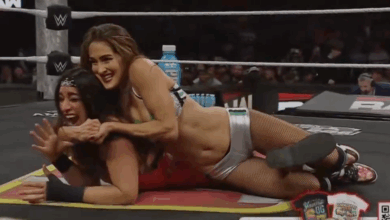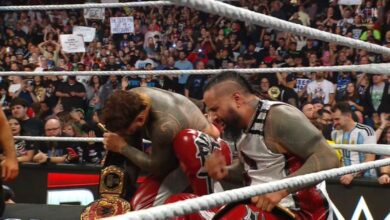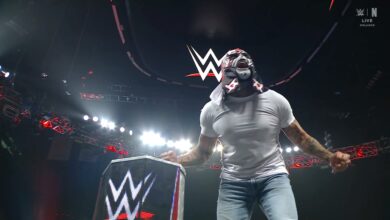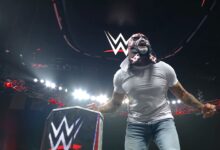EXCLUSIVE: Colt Cabana Talks Rejoining ROH, Wrestling Society X Memories, Wrestling Road Diaries 3

Editor's Note: Better late than never, they say. I'd interviewed ROH star Colt Cabana last year ahead of the release of his Wrestling Road Diaries 3 DVD release. After going through two transcribers, I decided to do it myself, only to have the audio file of the interview corrupted. Fortunately, I was able to salvage it weeks later, have it transcribed (thanks, Alex) and will have several pieces of content from the host of the Art of Wrestling Podcast, and one of the most popular independent wrestlers on the scene.
Fightful: This one really seems to focus on comedy … how different is this one from the others or is it?
Colt: “So the underlying theme will always be like, “Hey this is independent wrestling that not many people are aware of; you’ve seen documentaries of the stars and how they do WrestleMania weekend, well this is how it really works on the scene” so that theme is always the same. But in order to change it up, there always has to be kind of different themes, so this one is a dissection of comedy in wrestling. The first one was kind of like “Here’s how the indies work,” the second one was like “Here’s how the indies work when you come back from the WWE, and you have to learn how to be an independent wrestler again” and this one is “how comedy wrestling works,” and yeah, I flew over two of the biggest stars in the world of comedy wrestling, and then we mixed them up in the Midwest … I don’t know of anything that’s ever really dissected it like this before and given you kind of an inside look of comedy and wrestling, I think people just think it’s like a crutch that wrestlers use if they don’t know how to wrestle, and I think you really learn that it’s an unbelievable skill and art in order to make people laugh while within the context of professional wrestling.”
Was the filming process any different this time than the previous two, because the first one was in like 2009 and technology’s come a little bit further since then, did that affect you at all?
“So Jack was the guy who was our cameraman and edited it together. He’s the filmographer for Fallout Boy and other bands, so he’s really up to date with all of that stuff. And in terms of technology … Sonjay was watching it the other day and he was like “this one looks so much crisper and you can tell the HD and you can tell he has better equipment” so from that stand point, yeah. From filming, the first one was (shot in) ten days and the movie was 2 hours and 40 minutes. I realized that we don’t need that much movie, so this one was just shot over a long weekend, just like the second one was.”
Daniel Bryan went from “Wrestling Road Diaries” straight to WWE, Luke Gallows ended up in WWE, what do you think the chances are Grado just blows you off, says “no Wrestling Road Diaries 4 for me, I’m WWE bound”, Colt?
"I love how you don’t even give Kikutaro a chance! He’s moving over to America!"
So which do you think is more likely?
"I don’t know. I hope all of them get to do everything that they wanna do, I hope they get to live their dreams. You know, in the movie, Grado calls Dean Malenko a “C-nt” in the nicest way. It’s a Scottish thing. And so I hope he gets that dream of walking by Dean Malenko, the C-Word. I think that’s one of his dreams, so I hope that happens for him."
Are you planning on doing any more of these? You’ve been able to make them all different so far; there’s a different underlying story in all three. Do you plan on doing a fourth one and if so, will it continue to have a different storyline to it?
“Yeah, I think it’s going to be an ongoing series, I hope, forever. … I’ve toyed with the idea of, Marty and I we do a comedy show around the US. An idea I’ve had is documenting that tour. Also, I’ve thought about doing just an audio Wrestling Road Diaries, which I think would be really different. Obviously that’s kind of my bread and butter is the audio and I’ve gotten really good at doing it, so that’s a thing I’ve thought about, too. And also doing one overseas I think would be the other option. I’d love to do one in Japan, or I’d love to do one in the U.K., either Edinburgh during the festivals that I do, or there’s a thing called “the camp scene” that many people don’t know about in England where you go to these little holiday camps and you wrestle in front of people that are staying there for a week that can’t afford to go to like Spain or Greece. So there’s a lot of interesting stuff out there, where it would still be the idea of “here’s what independent wrestlers do” but also “here’s this other weird thing that no one’s kind of dissected.”
Speaking of your audio work, have you ever been approached to like do Satellite radio or anything like that? I’m surprised that you’re not already doing that.
“No, no one’s ever approached me for any of that stuff. I have some friends over at WBZ in Chicago and there was some hopes that maybe somebody would wanna do something with me over there, but it’s nothing I’ve reached out to. I’m obviously so crazy busy, but that’d probably be something I’d like to do, kind of some more like NPR type stuff or public radio type stuff I thought would be really fun. In the early years of the podcast, an ESPN affiliate hit me up … they just wanted to play my podcast on ESPN radio, but the deal was so weird it just didn’t seem like the right fit for me, which is kind of interesting, and gives you a little inside look that there’s like NO money in radio, so I think podcasting was kind of the right fit, the right time for me and maybe one day hopefully that’s something I can kind of venture into. I’d like to. It’s something I’d like to venture into.”
No end in sight for the podcast, I would imagine?
“As long as I’m still around wrestling and still around the guys and able to take my recorder around the country and around the world, there’s no reason not to do it. And also, the podcast, it saved my life, saved my career. It’s made the quote un quote “success story” that I’ve become, and I owe everything to the medium, I love the medium. I mean, wrestling’s my true passion, but this is like an extension of it. “
Speaking of wrestling, you returned to Ring of Honor last year. What was that like for you because you had that big match in Chicago, obviously and you hadn’t been there in a while and many doubted whether you would even WANT to return to Ring of Honor. How did that come about, how were you approached to return to ROH?
“Yeah, I mean I doubted whether I would ever return to Ring of Honor. It was the scenario of a new regime took over the company, and that regime hired Jim Cornette and Jim Cornette didn’t like me as a wrestler. Which is fine, he’s allowed not to like me, but I was kind of sad that no one took any consideration that I’d been there basically since the doors opened (at) Murphy Rec Center, and (to think) I was so easily disposable. And that sat on my shoulder for a long time. And 2011, 2010 is really when my career started blowing up, in terms of doing all this social media stuff and being on the cover of the Chicago Reader and the podcast and Rolling Stone and that kind of stuff, and just all this weird independent media. And so, when they released Jim, they asked me to come back and I kinda had a chip on my shoulder. And it was like as easily as they had fired me, I didn’t want them to as easily hire me back, like it was no big deal. So I decided (it wasn’t) something that I wanted to do. And then, you know, it’s been five years. Not that it was like negatively weighing on me, but they had reached out over the years, and it came to the point where it was like, “well let’s let bygones be bygones, no need to hold this over everyone, I’d like to start from a clean slate.” I had this positivity in my life and so it was my decision to head back, and also to get to wrestle a guy like Jay Lethal who I respect and is one of my good friends. So it was the right timing for everything and I’m excited to be back on the team now.”
So are you back with them for the foreseeable future? Because a lot of us didn’t know whether it was a short term deal, and how that would work.
"Yeah, I think for us, it’s kind of “play it as it goes.” And it’s been going really well so far, so I think we’re gonna keep on going.”
You’ve been teaming with Dalton Castle; that’s an interesting pairing.
“There’s some spoilers on the television I don’t want to give away if you don’t want to say it. I think Dalton and I in the ring together will make for some good television and business.”
I was also planning a feature on Wrestling Society X at one point. It’s been ten years since it came out, what are your memories of working with Wrestling Society X?
“That was just one of those things where you knew it would be ten days of your career, some people thought this was gonna be a thing that was gonna go forever, a lot of us hoped that it would catch on on MTV, and in those days it was like some things caught on, some things didn’t catch on, and a lot of us had hopes, but … I don’t remember if I thought it would or wouldn’t. Obviously, I would watch MTV at that time, I was 26, that was the demographic I was—they didn’t play any commercials, they weren’t hyping it, there was nothing in the media, and I think at that point we all realized, “well, this’ll be a one and done guy” but while we were filming, I made sure to make the most of it, and just like have a great time, and I think a lot of us did. That’s an opportunity that doesn’t come along very often, being on a set, just doing what you love, there would be celebrities popping in—I remember Donald Faison from Scrubs and all these bands and a lot of the comedians from the comedy store, so it was kinda fun to mingle in with all those guys.”
I remember Good Charlotte did commentary one time.
"Yeah, I think all those bands sat in and did commentary."
Were you surprised that MTV wanted to get into the wrestling business, even for a shot at it?
"No, you remember they did Sunday Night Heat for a hot second. … You know, I go to Hollywood all the time and I perform at Lucha Vavoom and that’s such a successful thing, I know they’ve tried to make it a TV show, just the scene that’s there and the celebrities that show up there. I think they run eight shows a year, it’s 2000 people, it’s always sold out, and with the right formula, wrestling could be so cool, and I think MTV (was) trying to tap into that.”
Do you think that had anything to do with some of the inspiration for Lucha Underground? There are a lot of comparisons drawn, but Lucha Underground came seven or eight years later.
“I think I’m the wrong person to ask for that one, I’m not really sure. I think Wrestling Society X was the pre-cursor for not having to do traditional arena-looking wrestling. And I think that is a big key to moving away and not trying to be WWE, because I think the key is trying to be an alternative. Like I think they’re smart where they’re not trying to have a giant arena and have that kind of underground feel. And I do think (Wrestling Society X was) on the right path with that. And I think Lucha Underground is taking that same model, whether they took it from Wrestling Society X, I’m not sure.”
I look back fondly on that show. That’s how I discovered PWG, because I thought Human Tornado was like the coolest dude on earth when I saw him on Wrestling Society X, and I figured out he was in PWG, and I’ve been a fan ever since, so it had long standing effects on me.
Do you think you’ll incorporate Ring of Honor into your Wrestling Road Diaries moving forward, or will you keep it to the smaller shows?
“When we did the first one, it was just a company owned by Carey Silkin and, you know, he didn’t care, but now there’s a lot of red tape and corporation and Sinclair stuff, where it’s probably easier just to stay away from that.”
You think you’ll be doing another one with Daniel Bryan when his contract expires?
“Oh, I doubt it.”
I don’t know if you’ve ever checked Talking Smack, but his utter lack of care about whether they keep him or fire him makes that show just unbelievable. He doesn’t care.
“Yeah, my friend Marty DeRosa tells me he watches it and he says it’s like the best thing because of that reason, not just him, but also, he’s like, you can tell its not a two hour, overly produced thing. You can just go on there and kinda be natural. And maybe that shows that’s what wrestling’s missing a little bit—it doesn’t have to be overly produced and scripted, just let these guys do a thing, because they’re good at what they do.”
That’s a big part of your success as well–you’re allowed to be you, you’re allowed to be creative in your own ways, not just in wrestling but on your podcast and things like that. Why don’t you think that’s done more?
“I mean, listen, I get it. … I get why they have it, they’re putting on this show for millions of people and there’s all this advertising money and the reality is there’s so many jobs that depend on so much stuff at that level, whereas for me, I’m my own boss, I’m my own employee, you know? It all depends on me, so I have the right to yea or nay anything. Everything I do is just based on whether I think it’s cool or not, where in corporate wrestling or WWE wrestling, there’s so many different layers that people have to (get through) and that’s when you start second guessing yourself and that’s when you start asking yourself, like, “will I get fired for this, will somebody else get fired for this, will something like that happen?” And so that’s a sacrifice you have to make, that freedom goes away. Luckily for me, that’s something I don’t have to worry about.”
Speaking of that, Grado is on Wrestling Road Diaries 3, he is contracted to TNA, was there ever a concern for him? “I better watch what I do, better watch what I say”?
“Well, I guess I’ll take that back, because Grado would be an example of a guy who doesn’t care. He just wants to have fun.”
He called Dean Malenko a C-nt.
"But in a great way; that’s a term of endearment in Scotland. It’s true."
It’s so much different today than it was even ten years ago, because ten years ago, you couldn’t have him and Finn Balor running around taking pictures together. That wouldn’t happen, because TNA and WWE are natural competitors and now you have him on Wrestling Road Diaries 3, which isn’t a production of TNA, it’s yours. Did you ever see wrestling going to this level, to where you could do that with somebody from TNA or maybe even WWE, who knows?
“I always look at it like, what’s a good example? It’s like Aziz Ansari, one day he’s on NBC on Parks & Rec and then he’s also on HBO doing a comedy special, or he’s guesting on a MTV show, or even the fact that his show’s on NBC and he does an ABC talk show. I don’t know, to me, it’s like who cares? You just wanna get these guys out there and show them and then if you’re a good marketer, you can market these guys. That’s always been my thoughts—just put people out there in the best position and then they can make money and you can make money.”
I can’t wait to check out Wrestling Road Diaries 3. Anything else you have to tell people before we go?
“Yeah coltmerch.com is where you get it. Digitalcolt.com will be available for digital Friday November 11th the first 1000 people will get a free autographed cover card signed by myself and Kiku Taro and Grado. And some of them Kiku Taro would write weird things, and conspiracy theories. Those are extra Easter Eggs.
I’m really interested in seeing the Kikutaro facet of this. How he translates.
“Yea my buddy Daivari he watched it and he was like I never thought I’d be this interest in Kiku. I want to know so much more about this guy. Hopefully it’s a window opened into his life and the way he is. And remember he is a legend, he’s done comedy matches in front of 50,000 people at the Toyko Dome with All Japan and stuff, and Great Muta, and Liger. So it’s a real honor to have him in and to have him show the West World about Kiku.”




